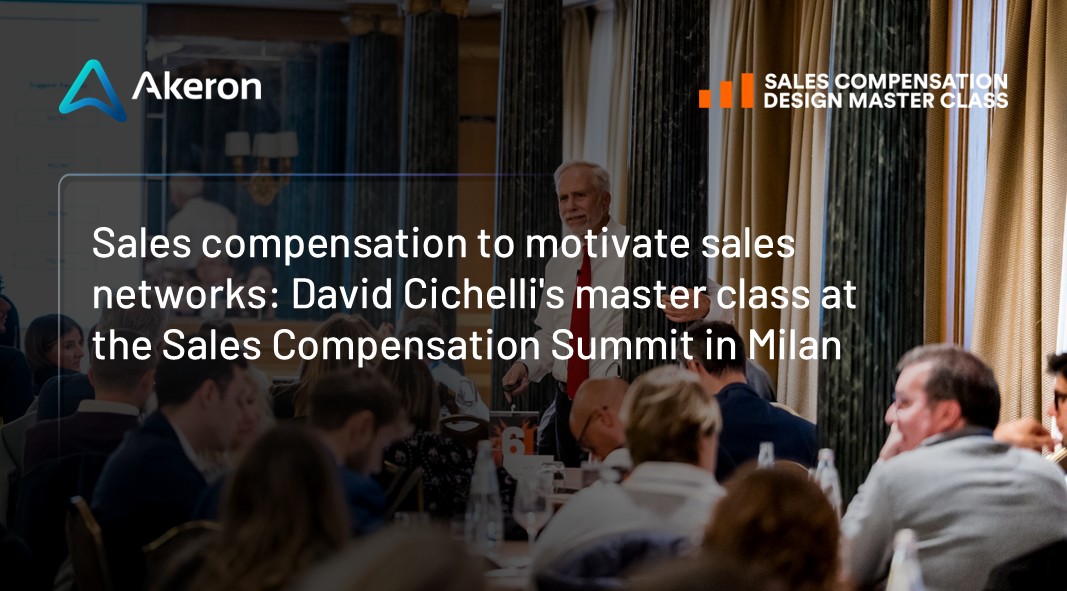In times of volatile markets and increasingly challenging targets, an effective incentive plan can mean the difference between a growing sales force and a declining one. This is the central message of the Masterclass in Sales Compensation Design, which is part of the Sales Compensation Summit in Milan on October 23, 2025. Akeron is the technology sponsor of the summit.
David Cichelli, one of the world’s leading authorities on sales compensation design and a point of reference for managers and professionals in the field, appeared in Italy for the first time, sharing his expertise with representatives from some of the country’s largest companies. In front of an audience of over 90 participants from sales, human resources, and finance departments, Cichelli offered a comprehensive overview of how to build an incentive plan that can drive growth for companies, both economically and culturally. This plan involves all stakeholders in behaviors that lead to the achievement of corporate objectives.
According to data shared today, 90% of U.S. organizations review their incentive strategy once a year and 10% review it extensively. In this scenario, compensation plans must be flexible, modular, and easy to update quickly in order to adapt to increasingly hybrid and data-driven sales models. “Companies must stop viewing incentives as a cost and start seeing them as an investment in performance,” Cichelli noted, urging businesses to embrace a cultural shift.
One of the most interesting topics covered in the Masterclass was the compatibility between sales compensation and artificial intelligence (AI). Cichelli explained that AI can support the analytical phase by improving the ability to interpret data and performance. However, its use in the design phase is still in its infancy. While initial experiments do not always produce results aligned with corporate strategy, the potential for evolution is enormous and set to grow rapidly.
Another key issue was aligning top management. In fact, the direct involvement of corporate leadership is essential for the success of any sales compensation project. According to Cichelli, the most effective approach is for senior management to agree on design principles beforehand and participate in selecting performance metrics for each sales role.
When evaluating the effectiveness of an incentive plan, the expert identified some key thresholds. If fewer than 50% or more than 90% of the sales force achieves its target, the plan likely has significant issues with balance or strategic alignment. Similarly, models that do not impact sales are a warning sign that the plans are ineffective and incorrect. This situation often applies to companies that have not updated their plans in a while. These plans are outdated and inconsistent with the new corporate direction.
Cichelli addressed the operational management of compensation plans, emphasizing that, beyond a certain complexity threshold (more than 50 salespeople and numerous monthly transactions), traditional spreadsheets are inadequate and dedicated Sales Performance Management solutions are necessary. These platforms enable monitoring of every transaction, ensuring traceability and transparency in payments. They also allow for simulation of review scenarios and provide sales teams with a clear, real-time view of results.
Cichelli also looked to the future and generational changes, challenging the common perception. “The new generations are asking for a better work-life balance, opportunities for growth, and a sense of fairness,” Cichelli comments, “but these are demands that every new generation has always made.” Therefore, the task of management is to remain steadfast in its values and strategic direction while attracting people who are most consistent with the corporate culture.
Upon reviewing the topics covered, it became clear that sales compensation is evolving into a strategic discipline capable of connecting people, data, and organizational culture. Creating effective models requires balancing analytical rigor and human vision, technology and leadership, and tradition and innovation. Masterclass participants had the opportunity to learn about international best practices and take home concrete tools to improve their organizations’ commercial performance, directly from one of the world’s leading experts on the subject.
By supporting the Summit, Akeron demonstrated its dedication to promoting a culture of innovation in sales performance management and fostering a community of companies focused on skills, efficiency, technology, and measurable results.
